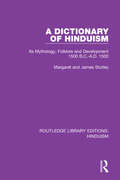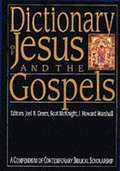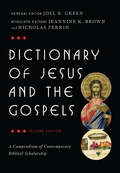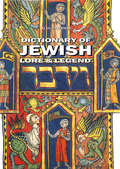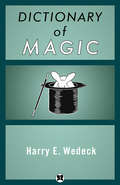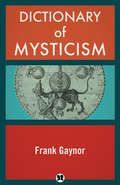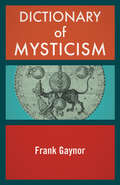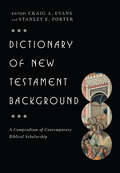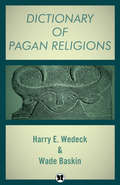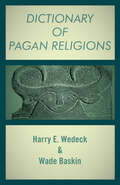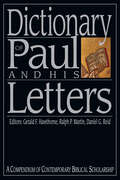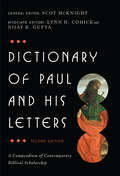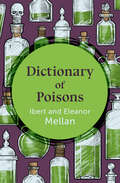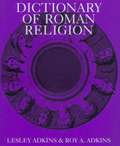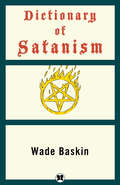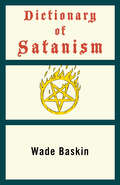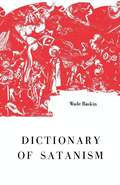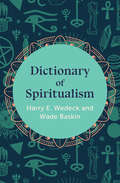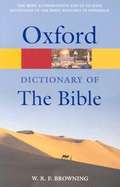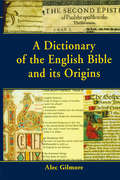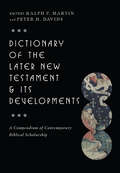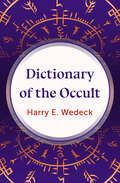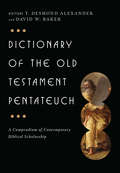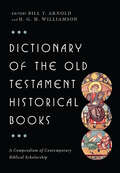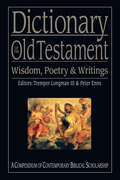- Table View
- List View
A Dictionary of Hinduism: Its Mythology, Folklore and Development 1500 B.C.-A.D. 1500 (Routledge Library Editions: Hinduism #2)
by Margaret and Stutley‘Hinduism’ is a term often used to summarize the aspirations of the majority of the Indian people. But any simple definition of it is difficult, if not impossible. This is partly owing to the nuances of the Sanskrit language, in which many texts are written, and partly to the too literal interpretation of Hindu imagery and mythology that often veils its real significance. This book, first published in 1977, is an essential reference source that goes some way to clarifying the difficulties of understanding Hinduism.
Dictionary of Jesus and the Gospels: A Compendium of Contemporary Biblical Scholarship
by Joel B. Green Scot Mcknight I. Howard MarshallRecipient of a Christianity Today1993 Critics Choice Award! Third Place Winner of Christianity Today's Book of the Year list award! The Dictionary of Jesus and the Gospels is unique among reference books on the Bible, the first volume of its kind since James Hastings published his Dictionary of Christ and the Gospels in 1909. In the more than eight decades since Hastings our understanding of Jesus, the Evangelists and their world has grown remarkably. New interpretive methods have illumined the text, the ever-changing profile of modern culture has put new questions to the Gospels, and our understanding of the Judaism of Jesus' day has advanced in ways that could not have been predicted in Hasting's day. But for many readers of the Gospels the new outlook on the Gospels remains hidden within technical journals and academic monographs. The Dictionary of Jesus and the Gospels bridges the gap between scholars and those pastors, teachers, students and lay people desiring in-depth treatment of select topics in an accessible and summary format. The topics range from cross-sectional themes (such as faith, law, Sabbath) to methods of interpretation (such as form criticism, redaction criticism, and death of Jesus) to each of the four Gospels as a whole. Some articles--such as the Dead Sea Scrolls, rabbinic traditions and revolutionary movements at the time of Jesus--provide significant background information to the Gospels.
Dictionary of Jesus and the Gospels (The IVP Bible Dictionary Series)
by Joel B. Green Nicholas Perrin Jeannine K. BrownChristianity TodayPreaching'sDictionary of Jesus and the GospelsDJGDictionary of Jesus and the GospelsDictionary of Jesus and the Gospels
Dictionary of Jewish Lore & Legend
by Alan UntermanA clear and well-illustrated guide to the main characters and legends of Judaism This book captures the richness and vitality of traditional Jewish culture: a web of legend, folklore and superstition that is crucial to understanding Judaism. Topics include Jewish law, literature and poetry; the festivals of the Jewish year; the languages and sub-groups within the Jewish community; and the many countries that Jews have lived in. The book also reveals another side of Judaism, a world populated by angels and demons, sages and Kabbalists, and creatures unknown to zoologists.
Dictionary of Magic
by Harry E WedeckDictionary of Magic by Harry E. Wedeck offers a broad understanding of the field of witchcraft, the occult, and its many manifestations, from early Babylonian times to the present day. It includes knowledge of words in this area from many continents and practices. It also discusses and analyzes occult practices and notable wizards and demographers.
Dictionary of Mysticism
by Frank GaynorThis dictionary provides concise definitions for over 2200 terms used in many philosophies, religions and doctrines which relate to the influence of the superhuman and supernatural on man's everyday life. Terms which are found in Esoteric Philosophy, Occultism, Religious Mysticism, Spiritualism, Alchemy, Psychical Research, and Religious Mysticism are defined. Particular attention is given to the Oriental philosophies of Buddhism, Brahmanism, Sufism, Lamaism, Zoroastrianism, Theosophy, and Cabbalism. Also included are terms used in Magic and Demonology.
Dictionary of Mysticism: Dictionary Of Mysticism, Encyclopedia Of Superstitions, And Dictionary Of Magic
by Frank GaynorMore than 2,200 terms defined in an essential reference on religious mysticism, esoteric philosophy, occultism, and more. Dictionary of Mysticism provides concise definitions for more than 2,200 terms used in many philosophies, religions, and doctrines which relate to the influence of the superhuman and supernatural on man&’s everyday life. Terms relating to esoteric philosophy, occultism, religious mysticism, spiritualism, alchemy, and psychical research are defined. Particular attention is given to the Eastern philosophies of Buddhism, Brahmanism, Sufism, Lamaism, Zoroastrianism, Theosophy, and Cabbalism. Also included are terms used in magic and demonology.
Dictionary of New Testament Background: A Compendium of Contemporary Biblical Scholarship (The IVP Bible Dictionary Series)
by Craig A. Evans Stanley E. PorterDictionary of New Testament BackgroundDictionary of Jesus and the Gospels, the Dictionary of Paul and His LettersDictionary of the Later New Testament and Its DevelopmentsDictionary of New Testament BackgroundDictionaryDictionary of New Testament Background
Dictionary of Pagan Religions
by Wade Baskin Harry E WedeckAssembled here for the first time in one volume are the essential facts about the cults, rites and rituals associated with polytheistic religions that have existed from the Stone Age to the present. The aim of the book is to create and preserve a partial record of the pagan religions or cults that have flourished since the dawn of mankind and of their impact and influence throughout the world. This record includes many of the forgotten religions and their ideologies, practices, and mythologies.
Dictionary of Pagan Religions: Dictionary Of Satanism, Dictionary Of Witchcraft, And Dictionary Of Pagan Religions
by Harry E. Wedeck Wade BaskinA comprehensive reference guide to religious cults of the ancient world, with essential information on religious systems, texts, temple sites, and more. Dictionary of Pagan Religions offers a wide-ranging survey of the many religious cults that have flourished around the world from the Stone Age to the present. From Egyptian to Celtic traditions, and Gnosticism to Cabala, coauthors Harry E. Wedeck and Wade Baskin have compiled in-depth information about the rites and rituals associated with these religious systems, as well as their surprisingly significant influence on mainstream theology and philosophy. This authoritative text includes many of the world&’s forgotten religions, with important information about their ideologies, practices, mythologies, and more. Arranged in A-to-Z format, Dictionary of Pagan Religions is an essential reference guide for any student of paganism, polytheism, or ancient religious practices.
Dictionary of Paul and His Letters: A Compendium of Contemporary Biblical Scholarship (The IVP Bible Dictionary Series)
by Gerald F. HawthorneDictionary of Paul and His LettersDictionary of Jesus and the GospelsDictionaryDictionary of Paul and His LetterssummaDictionary of Paul and His LettersDictionary of Jesus and the Gospels
Dictionary of Paul and His Letters: A Compendium of Contemporary Biblical Scholarship (The IVP Bible Dictionary Series)
by Scot McKnight Lynn H. Cohick Nijay K. GuptaThe Dictionary of Paul and His Letters is a one-of-a-kind reference work. No other resource presents as much information focused exclusively on Pauline theology, literature, background, and scholarship. This second edition is a thoroughly revised and updated version of the acclaimed 1993 publication. Since that groundbreaking volume was published, developments in Pauline studies have continued at a rapid pace, with diverse new scholars entering the conversation, new ideas and methods gaining attention, and fresh expressions of old topics shaping the present discussion. Those who enjoyed and benefited from the wealth in the first edition will find this new edition an equally indispensable and freshly up-to-date companion to study and research. Classic topics such as Christology, justification, hermeneutics, and book studies of individual epistles receive careful treatment by specialists in the field. Topics new to this edition—including Paul and politics, patronage, and interpretations from various historical and cultural perspectives—expand the volume's breadth and usefulness. Over 95% of the articles have been written specifically for this edition. This work bridges the gap between scholars and pastors, teachers and students, and all interested readers who want a thorough treatment of key topics in a summary format. In curating and compiling these articles, the editors have sought to make them comprehensive, accessible, and useful for those pursuing further research on particular subjects. Each article's bibliography, in addition, will serve a new generation of readers for years to come. The updated Dictionary of Paul and His Letters takes its place alongside the Dictionary of Jesus and the Gospels, 2nd ed., and the other volumes in the IVP Bible Dictionary Series as a unique presentation of the fruit of biblical studies—committed to Scripture, using the best of critical methods, and maintaining dialogue with both contemporary scholarship and the challenges facing the church. The reference volumes in the series provide in-depth treatment of biblical and theological topics in an accessible encyclopedia format, including cross-sectional themes, methods of interpretation, significant historical or cultural background, and each Old and New Testament book as a whole.
Dictionary of Poisons
by Ibert Mellan Eleanor MellanThis mid-twentieth-century reference guide offers a comprehensive list of poisons, with information on their origins, effects, antidotes, and more. First published in 1956, Dictionary of Poisons offers a unique look back at the timeless perils of poison. In their introduction, coauthors Ibert and Eleanor Mellan discuss the history of poison, from Biblical references to ancient Greek suicide and the historical evolution of homicidal poisoning. They then present practical information about a wide range of poisons, from household products to misused medicines and more. Arranged alphabetically, each entry includes a brief description of a given substance, along with possible causes and symptoms of, as well as first aid treatments for, poisoning.
Dictionary of Roman Religion
by Lesley Adkins Roy A. AdkinsBreaking with the long tradition of presenting classical Roman mythology as a reworked and diluted version of its Greek counterpart, offers entries ranging from short definitions to short essays on both the primitive, native aspects and the cosmopolitan fertility of mythology incorporated from Judaism, Druidism, Mithraism, and other cultures. Includes deities and their kin, festivals, events, writers, places and buildings, cult objects, burial rites, and other aspects. Well cross-referenced, and most entries are referenced to the bibliography. Includes a glossary without pronunciation. Annotation c. by Book News, Inc., Portland, Or.
Dictionary of Satanism
by Wade BaskinA handy, comprehensive guide to a wide range of topics relating to the awesome power and cult of Satan, in myriad forms and under many different names, from ancient times to the present. Distilled from hundreds of reliable sources, both religious and secular, the entries include men and movements, orders and objects, rites, rituals, incantations, events, legends, and occult practices that have fascinated the mind of man through the ages. It also contains entries relating to a host of unorthodox beliefs and irrational acts, such as the murder of Sharon Tate, which have only recently come to light. The simple manner in which even the most abstruse topics are handled is certain to open the mysterious world of darkness to readers with no prior knowledge of the occult and to intrigue and inform those who seek to extend their knowledge of the subject.
Dictionary of Satanism: Dictionary Of Satanism, Dictionary Of Witchcraft, And Dictionary Of Pagan Religions
by Wade BaskinA comprehensive A-to-Z reference guide to the terms, concepts, influential figures, and key events associated with Satanism. Dictionary of Satanism is a concise yet wide-ranging reference guide for the casual reader or student of satanic practices. It features essential information on the important concepts, issues, people, places, and events associated with Satanism, as well as the myriad forms and names that satanic worship has taken from ancient times to the present. Author Wade Baskin also covers a host of unorthodox beliefs and irrational acts, such as the murder of Sharon Tate. Distilled from hundreds of reliable sources, both religious and secular, the entries include men and movements, orders and objects, rites, rituals, incantations, legends, and occult practices that have fascinated the mind of man through the ages.
Dictionary of Satanism
by Wade BaskinA handy, comprehensive guide to a wide range of topics relating to the awesome power and cult of Satan, in myriad forms and under many different names, from ancient times to the present. Distilled from hundreds of reliable sources, both religious and secular, the entries include men and movements, orders and objects, rites, rituals, incantations, events, legends, and occult practices that have fascinated the mind of man through the ages. It also contains entries relating to a host of unorthodox beliefs and irrational acts, such as the murder of Sharon Tate, which have only recently come to light. The simple manner in which even the most abstruse topics are handled is certain to open the mysterious world of darkness to readers with no prior knowledge of the occult and to intrigue and inform those who seek to extend their knowledge of the subject. Wade Baskin (1924–1974) was an American author and translator. Known for his extensive list of books on the occult and for his studies of linguistics and philosophy, Baskin also taught at Southeastern Oklahoma State University, where he was inducted into the Faculty Hall of Fame. He was the editor of Classics in Education.
Dictionary of Spiritualism
by Harry E. Wedeck Wade BaskinAn encyclopedic survey of esoteric traditions, supernatural phenomena, and spiritualist thinkers from ancient mythmakers to present-day gurus.The concept of the supernatural applies to a variety of occurrences that are beyond the grasp of typical human consciousness. Supernaturalism encompasses the animate and the inanimate; the physical and the metaphysical; Heaven, Hell and all that is between. This reference guide offers an in-depth survey of these phenomena, as well as the terminology and personalities connected to various spiritualist traditions that have sought to understand them.Dictionary of Spiritualism ranges across the world, and from antiquity to the twentieth century, touching on a multiplicity of legends, mythologies, beliefs, and supernatural events that are far beyond mortal comprehension.
A Dictionary of the Bible
by W. R. F. BrowningThis revised edition is the most authoritative, accessible, and up-to-date dictionary of the Bible available in paperback. As well as providing helpful information about important places and personalities, it is particularly concerned to expound the themes and doctrines of the Bible and to indicate their status in the light of modern scholarship. With entries ranging from earthquakes and mice to feminism and the Dead Sea Scrolls, the dictionary is a lively and absorbing reference work for all readers of the Bible. -Over 2,000 entries from Adam to Zechariah -Clear explanations of technical terms, methods of interpretation, and critical analysis, as well as notes on leading biblical scholars and their contributions -Broad coverage includes the books of the Bible, people and places, customs, religions and worship, history, and theology -Takes into account the work of Christian scholars of all denominations and Jewish scholars
A Dictionary of the English Bible and its Origins (Biblical Seminar Ser. #No. 67)
by Alec GilmoreThe Dictionary of the English Bible and Its Origins is designed to increase awareness of the origins of the Bible; to introduce readers to the variety of versions and manuscripts that lie behind the familiar English translations;to provide, in alphabetical order, entries on texts, versions, manuscripts, persons, places and terminology, covering the origins of the Hebrew Bible, the New Testament and the English Bible, including the most recent translations; and generally to facilitate a more intelligent understanding of the Bible among lay people by removing some of the mystique and prejudices associated with it. Entries are factual, not evaluative, and reflect contemporary biblical scholarship. Dictionary of the English Bible and Its Origins will prove to be a handy reference tool for anyone with an interest in the Bible.
Dictionary of the Later New Testament & Its Developments: A Compendium of Contemporary Biblical Scholarship (The IVP Bible Dictionary Series)
by Ralph P. Martin Peter H. DavidsChristianity Today'sDictionary of the Later New Testament & Its DevelopmentsDictionary of the Later New Testament & Its DevelopmentsDictionary of Jesus and the GospelsDictionary of Paul and His Letters
Dictionary of the Occult: Dictionary Of Mysticism, Encyclopedia Of Superstitions, And Dictionary Of Magic
by Harry E. WedeckA comprehensive reference guide to all things occult, covering a broad range of magic tradition from Babylonian times to the present day. This authoritative reference text by linguist and occult expert Harry E. Wedeck offers a broad understanding of witchcraft, necromancy, paganism, the occult, and many of magic&’s other manifestations. With in-depth information on essential concepts, practices, and vocabulary, Dictionary of the Occult also covers many of the most notable wizards and demonographers. Perhaps the most famous word in all of magic, Abracadabra is in fact a magic formula used in incantations against sickness or ill luck. Black Mass is a mass held in honor of the Devil. Geloscopy is the practice of divination through observing someone&’s laughter. From A-to-Z, Wedeck covers magical names and terms from around the world and down through the ages.
Dictionary of the Old Testament: A Compendium of Contemporary Biblical Scholarship (The IVP Bible Dictionary Series)
by T. Desmond AlexanderA 2003 LOGOS Book Award WinnerAn ECPA 2003 Gold Medallion Finalist The first five books of the Old Testament lay the foundation on which the rest of Scripture stands. Its great themes, epochal events and towering figures set down vectors on which the biblical story is played out. The very shape of the rest of the Old Testament would collapse were the Penteteuch to be removed. The structure of New Testament thought would be barely intelligible without it. Here we meet the great ancestral figures of Israel--Abraham, Isaac and Jacob--and the towering figure of Moses, whose presence dominates four of these five books. The creative act of God, the paradisal garden, the exile of Adam and Eve, the judgment of the great flood, the call of Abraham from among the nations, the covenant of Abraham, the exodus from Egypt, the giving of the law at Sinai, the plan of the tabernacle, the varied experiences of Israel in the wilderness, and the announcement of the covenant blessings and curses--all of these and more contribute to a work of world-formative power. This dictionary explores the major themes and contours of the Pentateuch. Behind and beneath the grandeur of the Pentateuch, issues of historicity have both puzzled and beckoned. But whereas in the mid-twentieth century many English-speaking scholars were confident of archaeological support for the patriarchal accounts, the climate has now changed. In the most extreme cases, some contemporary scholars have radically challenged the antiquity of the ancestral stories, arguing for their final composition even as late as the Hellenistic era. This dictionary examines and weighs the historical issues and poses possible solutions. The documentary hypothesis, the former reigning critical consensus, is now widely rumored to be on life support with no heir apparent. Meanwhile, conservative scholars reconsider what indeed a claim to Mosaic authorship should entail. This dictionary offers an assessment of the array of questions surrounding these issues and considers some possible ways forward for evangelical scholarship. At the same time, there has been a fruitful turning to the nature, message and art of the received text of the Pentateuch. Literary studies of brief episodes, sprawling sagas, complex narrative and even the fivefold composition of the Pentateuch itself have delivered promising and exciting results. This dictionary offers both appreciative panoramas and close-up assessments of these developments and their methods. The Dictionary of the Old Testament: Pentateuch is the first in a four-volume series covering the text of the Old Testament. Following in the tradition of the four award-winning IVP dictionaries focused on the New Testament and its background, this encyclopedic work is characterized by close attention to the text of the Old Testament and the ongoing conversation of contemporary scholarship. In exploring the major themes and issues of the Pentateuch, editors T. Desmond Alexander and David W.Baker, with an international and expert group of scholars, inform and challenge through authoritative overviews, detailed examinations and new insights from the world of the ancient Near East. The Dictionary of the Old Testament: Pentateuch is designed to be your first stop in the study and research of the Pentateuch, on which the rest of the Bible is built. Note: Because this ebook is large, please allow a little extra time to download after purchase.
Dictionary of the Old Testament: Historical Books (The IVP Bible Dictionary Series)
by Bill T. ArnoldDictionary of the Old Testament: Historical BooksDictionary of the Old Testament: PentateuchDictionary of the Old Testament: Historical BooksDOTHB.DOTHBDOTHBDOTHB
Dictionary of the Old Testament: A Compendium of Contemporary Biblical Scholarship (The IVP Bible Dictionary Series)
by Tremper Longman IIIChristianity TodayThe Old Testament books of wisdom and poetry carry themselves differently from those of the Pentateuch, the histories or the prophets. The divine voice does not peal from Sinai, there are no narratives carried along by prophetic interpretation nor are oracles declaimed by a prophet. Here Scripture often speaks in the words of human response to God and God's world. The hymns, laments and thanksgivings of Israel, the dirge of Lamentations, the questionings of Qohelet, the love poetry of the Song of Songs, the bold drama of Job and the proverbial wisdom of Israel all offer their textures to this great body of biblical literature. Then too there are the finely crafted stories of Ruth and Esther that narrate the silent providence of God in the course of Israelite and Jewish lives.Dictionary of the Old Testament: Wisdom, Poetry Writings.Coverage of each biblical book includes an introduction to the book itself as well as separate articles on its ancient Near Eastern background and its history of interpretation. Additional articles amply explore the literary dimensions of Hebrew poetry and prose, including acrostic, ellipsis, inclusio, intertextuality, parallelism and rhyme. And there are well-rounded treatments of Israelite wisdom and wisdom literature, including wisdom poems, sources and theology. In addition, a wide range of interpretive approaches is canvassed in articles on hermeneutics, feminist interpretation, form criticism, historical criticism, rhetorical criticism and social-scientific approaches.Dictionary of the Old Testament: Wisdom, Poetry WritingsTremper Longman III and Peter E. Enns edit this collection of 148 articles by 90 contributors on Job, Psalms, Proverbs, Ecclesiastes, Song of Songs, Lamentations, Ruth and Esther.
